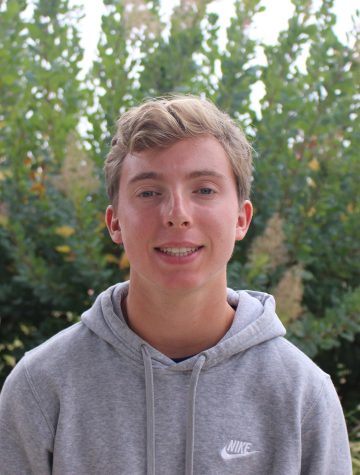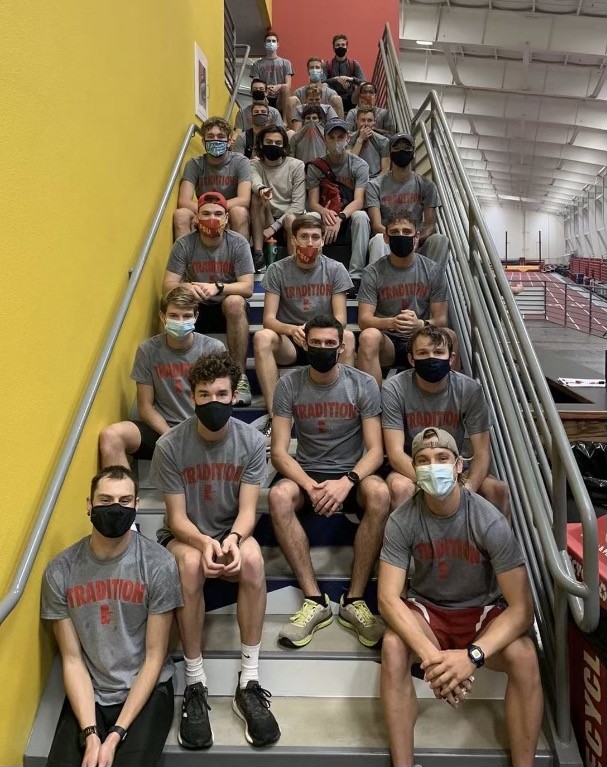COVID impact on former DHS students in college
Graham Hudelson and the Pitt State distance program pose for a picture at Pittsburg State University this fall.
While COVID-19 has had a substantial effect on current De Soto High School students in 2020, former DHS students who have moved forward into post secondary schooling have also been impacted by the virus.
For incoming college freshmen, expectations usually consist of attending sporting events, a handful of lecture-based classes and meeting new people. However, COVID-19 has made their initial college experience much different.
“It was stressful because I didn’t know which classes were online and which ones were in-person,” Quinlan Robke, former DHS student and freshman at Kansas State University said. “I didn’t know what to expect, with meeting people at sororities and everything.”
Chase Culver, a freshman at the University of Colorado at Colorado Springs, expected to spend his first year in the school dorms and attend in-person classes.
“It’s been different because I can’t live in the dorms,” Culver said. “I also only attend class via Zoom, and college hasn’t been as social as I thought it would be.”
For Rylie McDaniel, a sophomore at the University of Kansas, this year has been a significant adjustment from her freshman year in college.
“It’s completely different,” McDaniel said. “Last year I had all in-person classes, and one of my lectures last year had 500 students attend. It’s been a complete 180 since classes are all online.”
Graham Hudelson, a sophomore at Pittsburg State University, has also experienced a lot of changes compared to his first year. However, while most college courses have switched to online, Hudelson has been able to participate in some classes in-person.
“For my major, we’ve had in-person classes all semester,” Hudelson said, who is working towards a degree in construction management. “Classes are about half full and masks are on at all times.”
With all of the changes and adjustments that colleges have had to make, students are finding ways to adapt.
“I’m trying to make the most of it,” McDaniel said. “I’ve learned to be patient.”
Culver has also adjusted to his unexpected college environment, trying to find ways to enjoy his surroundings at UCCS.
“I knew people in the dorms would be sent home before break, so I got an apartment to stay on campus,” Culver said. “I’ve also learned that being lonely and independent can be good. It’s given me a chance to explore the city and space around me.”
With on-campus events being cancelled, Culver has gone hiking and skydiving with his free time.
The absence of events and social gatherings has been a theme for several college students. Robke spoke to the many changes being made around campus.
“We couldn’t tailgate for football games,” Robke said. “We have to wear a mask everywhere on campus and dining halls only allow pick up.”
At KU, McDaniel described the fluidity of football and basketball games, regarding spectator capacity.
“Capacity for basketball has been up in the air, with only 1,500 fans allowed in Allen Fieldhouse,” McDaniel said. “It’s really weird to not have that atmosphere people are used to.”
Event cancellation and limited capacities are not surprising, with rising COVID-19 infections on several college campuses. Robke described the case fluctuation K-State has experienced over the first semester.
“There was definitely a huge increase at the start of the semester, with fraternities shut down,” Robke said. “There’s also been a spike with students being tested before going home for the holidays.”
Hudelson, who is a part of Pitt State’s track and field program, is one of many student athletes that has had their athletic seasons impacted by the virus. He detailed the impact the virus has had on PSU and him personally.
“Recently they [COVID-19 infections] became way more frequent after Halloween and mid-October,” Hudelson said. “Ten of my teammates got it, including myself, about half of my team.”
As winter break approaches for most of higher education, colleges have varied dates for when their students will return to learning. For Culver, the holiday break is similar to how it’s been in years past.
“It’s about a month long,” Culver said. “Our university is pretty much shut down right now.”
However, some students are experiencing much longer breaks. For instance, KU’s winter break is two and a half months long.
“Most colleges have a fall break, a Thanksgiving break, and then a winter break. We haven’t had a break for 15 weeks,” McDaniel said. “But our holiday break is super long, we don’t come back until mid-February.”
Regardless of the varied circumstances, students in higher education are living a college lifestyle that is far different from their former experiences and expectations. Despite the numerous adjustments, postponements and cancellations, these De Soto graduates continue to look forward to the brighter days ahead.

Meet Brady Huggins, Staff Reporter. This is Brady's seniorr year, and his first year on staff. His favorite stories to write about are sports stories,...


